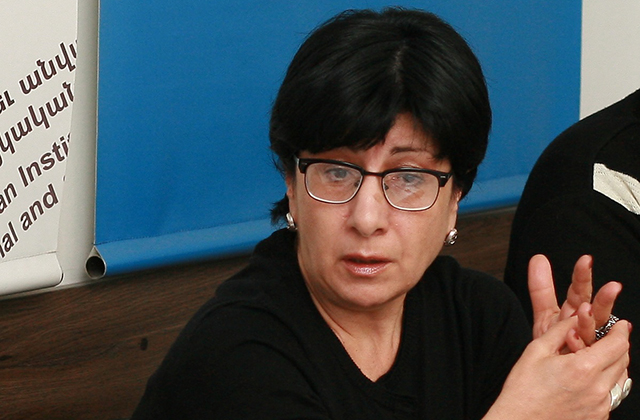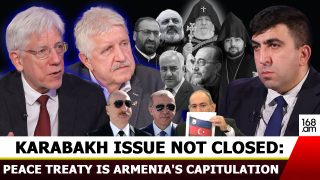General Outline of Discourse on External Security and Threat in Armenian Mass Media towards 2016

“We are all hostages of media intoxication, induced to believe in the war…, and confined to the simulacrum of war as though confined to quarters. We are already all strategic hostages in situ (Latin-in its original place); our site is the screen on which we are virtually bombarded day by day.”
This description by Jean Baudrillard, famous philosopher and culturologist, of real war and its images spreading around, until recently could have been presumed as a classic formula for public perception of “not here, but now.” Meanwhile times of hot and real wars fell back recently, when different societies in different countries are getting acknowledged on the course and existence of wars not only from video plots, but for instance, from after-effects in their countries of origin.
In terms of facing the real threat of ongoing war “not here, but now,” even terrorist acts in Paris at last year’s fall didn’t have the same impact, as diverse mass of refugees, flowing from hot countries to theirs. Terrorist acts have certain starting and ending points—they can precisely be dated, can’t they? But refugee flow is a lasting process bringing financial, interethnic, mental, intercultural, and many other in-depth issues, able to shake systems, sharped for decades. What is crucial, they localize former “not here, but now” reality.
In this messy and dynamic era every threat is reexamined and redefined that is sometimes accompanied by polar justifications. Especially, when thanks to time peculiarities and wider internet access, from Armenia’s lookout even events happening in farther corners of the globe are perceived on emotional level, leaving just a net remnant like “it is dangerous everywhere.”
The situation has changed now. War, as a method to solve geopolitical, geo-economic and domestic policy issues has been decriminalized internationally, and nobody knows when the so-called new international order will be shaped. Additionally two developments (de facto breaking of 20-year ceasefire regime on Armenia-Azerbaijan conflict zone and escalation of Russia-Turkey political relations) have already thickened processes that previously were observed as contiguous, thus, in public discourse actualizing security issues to unprecedented extent as compared to others.
Especially in the second half of 2015 clashes on Armenia-Azerbaijan border, resembling not single firings, but complete acts of war (military operations), marginalized the widely-spread thesis on necessity of peaceful settlement of the conflict with Azerbaijan in Armenian public discourse. However, expectations from political negotiations under successful maintenance of ceasefire regime at large were turned into a manifestation of political romanticism. This can supposedly be marked as Azerbaijan’s propaganda, but not strategic and real political achievement.
In the aftermath of increase in number of combat losses by 1.5 time both for Armenian and Azerbaijani sides by late 2015 as compared to 2014, we faced a situation described as “tensions that reached to the peak” (RA Defence Minister S. Ohanyan, 9 December), as “a war, since, actually we have no more ceasefire” (RA Defence Minister’s spokesman A.Hovhannisyan, 22 December), and as “a conflict at quite an active phase” (CSTO Secretary-general N.Bordyuzha, 28 December).
Against the background of Russia-Turkey tension its Armenian aspect has actively been deliberated after shooting down of Russian SU-24 jet by Turkey (24 November), especially at the first shocking phase: а shock that was reflected in Russian mass media in form of zealous trespassing over almost all Armenia-Turkey controversies and sore spots. As if Russian-Turkish rapprochement was rather intensifying under the imperative of exclusively Armenian and not Russian interests, and as if this rapprochement would have been greeted in Armenian side with welcoming information fireworks.
Meanwhile, Russia-Turkey escalation of November 2015 met the same tension in Armenia, as Russia-Turkey rapid rapprochement was perceived before. And if that rapprochement (that reached its peak in December 2014, by a range of Turkish-Russian bilateral accords signed against the background of sanctions on Russia by the West) bothered Armenia in terms of Russia-Azerbaijan-Turkey likely conspiracy, then ongoing escalations can simply turn Armenia into an arena for Russia-Turkey hostilities. In this case, avoiding “others’ war and clashes” will be impossible, in which Armenia succeeded previously (08.08.08 Russia-Georgia and 2014 Russia-Ukraine wars).
Moreover, if prior to November 2015 Turkey’s engagement with hostilities against Armenia seemed possible from the so-called secondary positions (Turkey would appear as a strategic and brotherly state of Azerbaijan if the latter waged a war against Armenia and Nagorno-Karabakh), then under more sharpening of Russia-Turkey relations it may turn into the first actor in military actions against Armenia.
New accords on joint Armenian-Russian air defence, reached in December of the last year by Armenia’s and Russia’s Defence Ministers, rather strengthen than console fears on adding alien (Russian-Turkish) disorder to Armenia’s own war (Karabakh).
There is also another curious metamorphosis with respect to collective security systems. Against the background of scandalous and obviously complete defamation of CSTO in the eyes of Armenian public in December of the same year, NATO still keeps its former reputation for Turkey’s deterrence.
In the end, under more tense Russia-Turkey relations the NATO itself will be obliged to stand before the Russian army. Recent developments in the Middle East, first and foremost, Iran’s unsanctioning internationally speaks that such a scenario is regarded as the last option for NATO.
Laura Baghdasaryan
Director, Region Research Center
AIISA partner expert
“Improving Security Policy Debates in Armenia” Programme (NED)
The Armenian Institute of International and Security Affairs (AIISA)

























